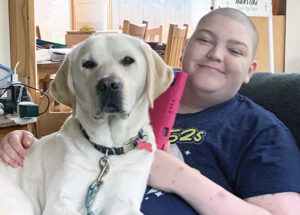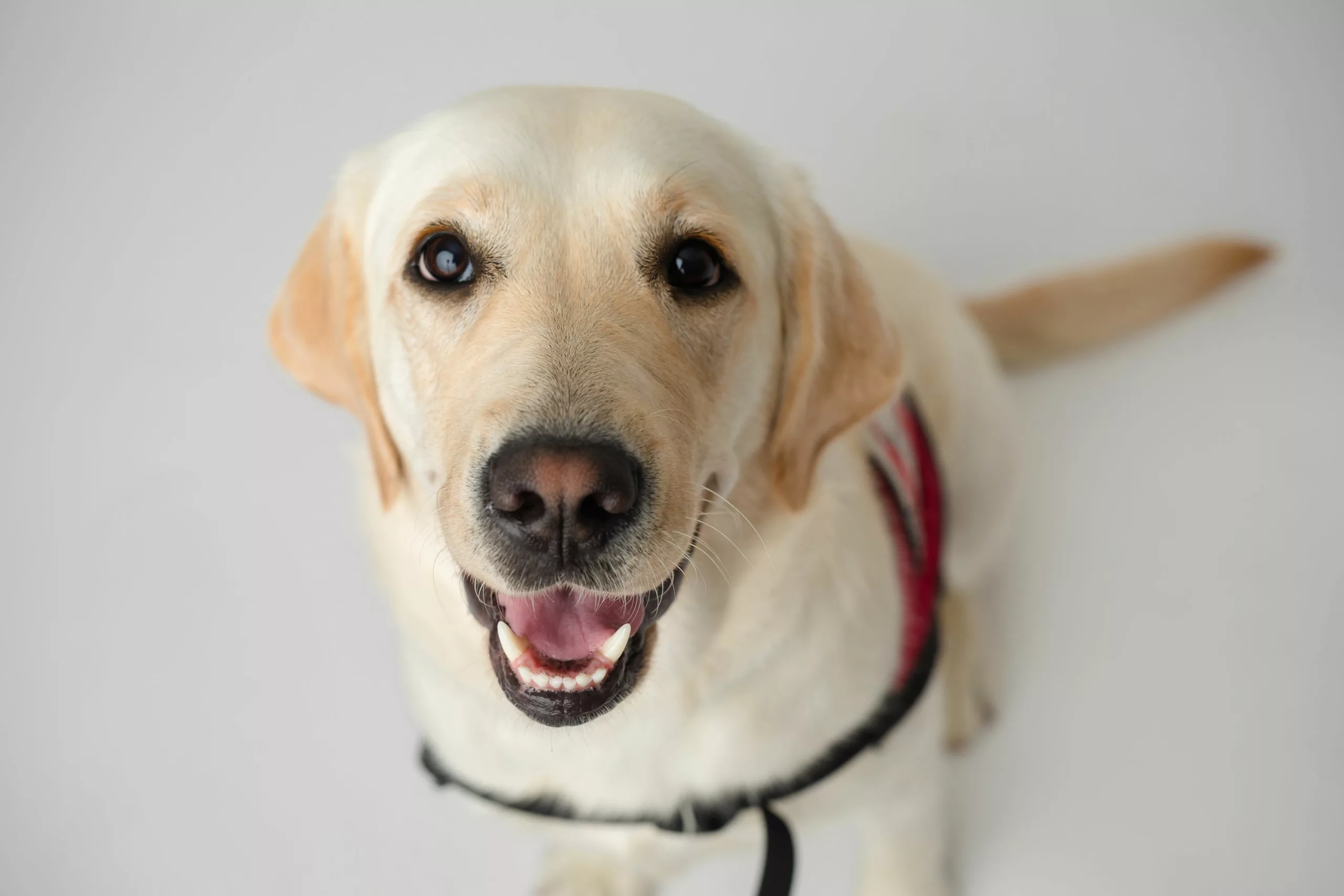Disabilities don’t play by rules or follow textbook criteria. They often show up and cause issues beyond anyone’s expectations.
Hannah has lived with a unique disability and conditions that complicate numerous aspects of her health, and traditional treatments have not been able to offer as many resolutions. At 13 years old, she was training for a half marathon and developed a pain in her left leg. It was discovered to be caused by a bone cyst, but its removal triggered her immune system to attack her muscles. She was eventually diagnosed with the refractory form of juvenile myasthenia gravis, a neuromuscular disease that, for Hannah, did not respond to conventional treatments. Additional diagnoses add to Hannah’s skeletal muscle weakness and fatigue, so just getting through most of her care ends up exhausting her in a day. The family knew it would take a very special dog to help with tasks but also provide emotional support for Hannah’s recovery phases. After the family’s pet dogs passed away and Hannah’s sister moved away to college, they decided it was the right time to apply for a Mobility Assist Dog.
 A New “Leash” on Life
A New “Leash” on Life
When Hannah met Newton, a 2-year-old yellow Labrador Retriever, it was hard to tell who was more excited in the moment. She recalls, “He went bananas,” and nearly climbed into her lap to smother her with kisses. She worked tirelessly to become the best handler for him that she could be, and he has just become more smitten by the day. Hannah enjoys educating herself on new things, so she has been excited to delve into training.
Hannah has more daily concerns and greater levels of understanding her own health than most young adults can imagine. Due to her need for blood thinners, an injury can result in detrimental consequences. She and her family battle constant fear of her falling if she reaches for items, or tripping over items on the ground. Newton relieves those worries by picking up all items she needs or that are in her way. Generally, Hannah had to rely on her father to go with her places or help her function throughout the day. “I didn’t realize how dependent I was on everybody else until I got Newton, but it was getting really bad where I was needing help with pretty much everything,” she remembers. After initial team training, Hannah has taken Newton for outings other than the hospital—something she could never do independently.
Newton has quite a list of accomplishments, which include but are not limited to retrieving, bringing a water bottle to a family member for a refill and back to Hannah, tugging carts and doors, carrying Hannah’s medicine bag, activating push plates, applying light pressure therapy, and pulling sleeves and socks off. Additionally, Newton helps to nudge her arm back onto the armchair when she is too tired to raise it entirely on her own, and he tugs a rope that Hannah holds when she’s stuck in a “turtling” slump on the sofa, so she can go to a sitting position, and from sitting to standing. He even “dresses” Hannah by picking out her outfit from her laundry piles. Hannah says the highlight of their relationship is to see him get something right, he has a proud wiggle when he celebrates a success.
Before Newton came into Hannah’s world, her constant procedures and therapies would be as mentally debilitating as they were physically strenuous. She goes to the hospital for plasmapheresis, which is similar to dialysis, three times per week, then receives chemotherapy every three weeks for her condition. Hannah has scar tissue and a fistula in her arms, causing severe discomfort, but Newton will lick her arms to stimulate circulation on a regular basis. An intense fear of needles makes the regular hospital trips a distressing experience for Hannah, but she has found a new focus other than pain. With Newton by her side, he applies light pressure therapy to redirect her attention during plasmapheresis. Going on her own to the hospital is a thing of the past, and Hannah is thrilled to know she doesn’t have to feel so alone for her treatments. She also spends hours in her room on a ventilator, which is extremely isolating, and now Newton is able to alleviate her anxiety and loneliness. “It was more than what I’d hoped for. He really loves me and my family, but he always comes back to me,” says Hannah of her new partner.
Beyond the reduced need for physical assistance, Hannah hasn’t needed to reach out for mental health help from others as much as she used to. One day Hannah was having a panic attack, and Newton brought her medication bag to her. She also started a stress behavior of hitting her hand to her head, so he laid over her arm until she calmed down. Hannah shares, “Newton has made the reality I have much easier and brighter.” Her doctors and community confirm that they have noticed her becoming happier and more confident.
A Bright Boy Shines in a Dark Time
Having Newton has changed the family dynamic completely, and Hannah has been much more motivated to get out by herself so she can have more adventures with him. Her parents are thrilled to see her independence flourish, feeling more secure for her to be on her own with a sweet companion keeping her safe. Hannah’s father commented that her treatment by the public has improved with the presence of a dog. People are showing more consideration and offer help when they see Newton accompanying her. In the midst of a pandemic, Hannah said that the entire process felt very safe and worth the reward. Newton has even made a huge difference for the healthcare workers at Hannah’s hospital. There are doctors under layers of PPE and loads of pressure, working on very little sleep, who finally have a reason to smile when they see the team. She said the hospital feels like tension and gloom, personally as well as environmentally, but Newton creates a better experience for everyone they encounter.
Hannah says of everyone who has made Newton possible for her, “Of course thank you, but also that they have made me more of a productive member of society, and hopefully I’m able to contribute more than I was able to before having Newton.” Goals for her future are to volunteer at the Bell Museum, as well as work more on school and maybe college classes. Especially interested in the mutual benefits involved with the prison training program, she looks forward to volunteering with Can Do Canines in the future to share her appreciation for the inmate handlers. As for Hannah, her newfound freedom is a welcome relief.
Thank you to all those who made this partnership possible:
Puppy Raiser: The Lindemann family
Special Thanks: Ken & Holly Schultz
You: Thank you for your donations!

 Familiar with the Process; Still Delighted with the Results
Familiar with the Process; Still Delighted with the Results



